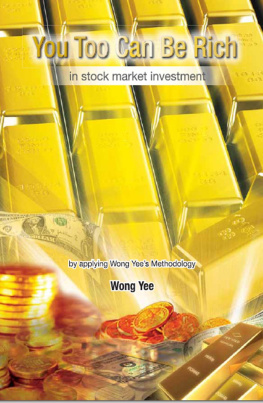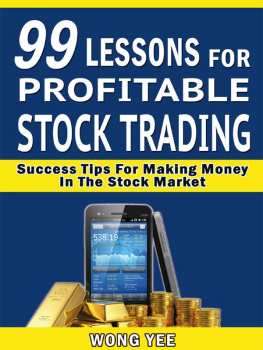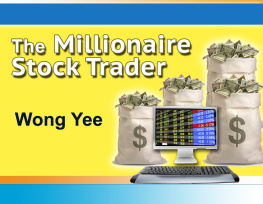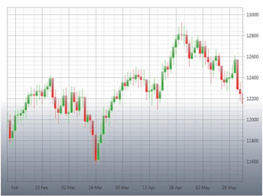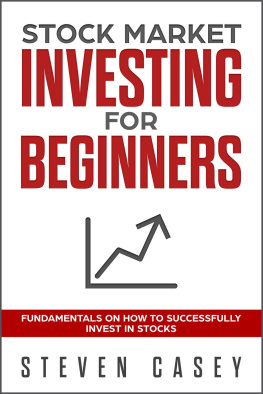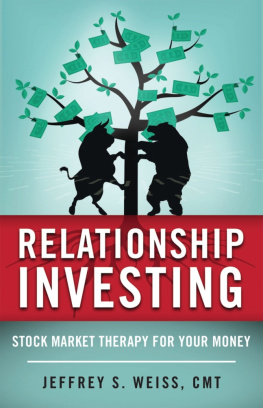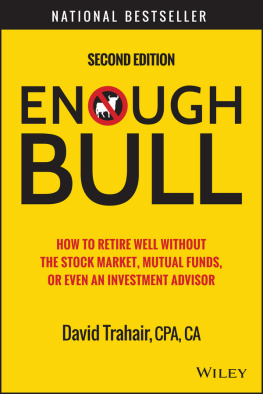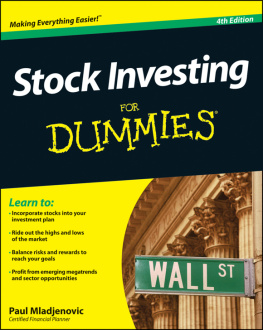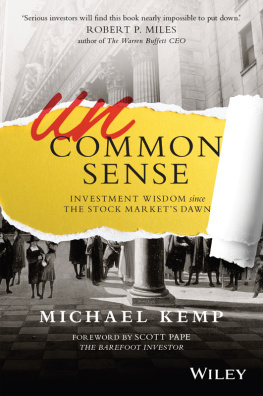Wong Yee - You Too Can Be Rich In Stock Market Investment
Here you can read online Wong Yee - You Too Can Be Rich In Stock Market Investment full text of the book (entire story) in english for free. Download pdf and epub, get meaning, cover and reviews about this ebook. year: 2013, publisher: BookBaby, genre: Business. Description of the work, (preface) as well as reviews are available. Best literature library LitArk.com created for fans of good reading and offers a wide selection of genres:
Romance novel
Science fiction
Adventure
Detective
Science
History
Home and family
Prose
Art
Politics
Computer
Non-fiction
Religion
Business
Children
Humor
Choose a favorite category and find really read worthwhile books. Enjoy immersion in the world of imagination, feel the emotions of the characters or learn something new for yourself, make an fascinating discovery.
You Too Can Be Rich In Stock Market Investment: summary, description and annotation
We offer to read an annotation, description, summary or preface (depends on what the author of the book "You Too Can Be Rich In Stock Market Investment" wrote himself). If you haven't found the necessary information about the book — write in the comments, we will try to find it.
Wong Yee: author's other books
Who wrote You Too Can Be Rich In Stock Market Investment? Find out the surname, the name of the author of the book and a list of all author's works by series.
You Too Can Be Rich In Stock Market Investment — read online for free the complete book (whole text) full work
Below is the text of the book, divided by pages. System saving the place of the last page read, allows you to conveniently read the book "You Too Can Be Rich In Stock Market Investment" online for free, without having to search again every time where you left off. Put a bookmark, and you can go to the page where you finished reading at any time.
Font size:
Interval:
Bookmark:
in stock market investment
by applying Wong Yees Methodology
Wong Yee
Ebook Edition 2013
Published and distributed by:
Wong Yee
ISBN 978-981-07-7874-3
Copyright Wong Yee
http://williamwongyee.blogspot.sg/
All Rights Reserved. No part of this publication may be reproduced or copied in any form or by any means - graphic, electronic or mechanical, including photocopying, recording, taping or information retrieval systems - without written permission of the Author.
Conditions of Sale: This book is sold subject to the condition that it shall not, by way of trade or otherwise, be lent, resold, hired out or otherwise circulated without the publishers prior consent in any form of binding or cover other than that in which it is published and without a similar condition including this condition being imposed on the subsequent purchaser.
While every reasonable care is taken to ensure the accuracy ofinformation printed, no responsibility can be accepted for any loss or inconvenience caused by any error or omission. The ideas, suggestions, general principles, examples and other information presented here are for reference and educational purposes only. This book is not in anyway intended to give investment advice or recommendations to trade stock or any other investment. The author or publisher shall have no liability for any loss or expense whatsoever relating to investment decisions made by the reader.
http://www.rankbooks.com/millionstocktraderecourse.htm

The concepts taught in the book is also available as an ecourse. In the Millionaire Stock Trader e-Course, Wong Yee reveals his most profitable trading secrets that will allow any trader to make HIGH profits but at LOW risks. This proven and tested methodology allows you to capture the maximum profits in any stock you trade with 90% accuracy. This methodology allows you to trade any stocks in any stock market US, Singapore, Malaysia and Hong Kong. The application of this methodology is simple, easy and yet highly accurate.
2008 was a year of nightmare. Thousands of investors lost money and retirees lost all their life savings. Everyone points a finger at Lehman Brothers for their misfortune. But the truth is, there are four fingers pointing back at you. So, who is to be blamed?
It is always believed that the stock markets wiped off trillions of dollars from the investors worldwide. So we become poorer by that magnitude. But, do you really wonder that when we lost a dollar, someone made that dollar. Thus, the truth is that it is a matter of changing the equation. To put it simple, the knowledgeable makes the dollar while the ignorant lost that dollar.
When we are young we can lose that dollar because we still have plenty of time to earn it back. But if we are old and retire, it will be indeed a sad tale.
To create wealth is not that difficult as most of us have that capability. However, to maintain wealth is never an easy task.
History always repeats itself. The 2008 world stock markets collapse will never be the last. Such catastrophe will come again and again in our life time. Hence, are you prepared for the next stock market crisis? When that happens, will you be aware so you can be the first to be out of the stock market? Therefore, we must take one step ahead of the crowds.
This book is the final analysis of the workings of the stock market. Those who follow the rules of the game will survive any crash and remain rich in retirement.
This book is dedicated to my four beloved children, Wei Peng, May Kwan, Foo Wah and Mun Sum.
Wong Yee


Computation of 10 Days Moving Average
Call it the panic of 2008, failures of major U.S. banks resulted in a global financial crisis that affected banks throughout Europe, causing global stock markets collapsed. It is considered by many economists to be the worst financial crisis since the Great Depression of the 1930s.
On 16 March 2008, JP Morgan Chase & Co. acquired troubled Wall Street firm Bear Stearns for US$2.00 a share, a mere fraction of what it was once worth. Bear Stearns was the worlds largest and most storied investment bank, which once hit a record peak of US$159.36 a share.
On 16 September 2008, Lehman Brothers Holdings Inc. declared bankruptcy and the Dow dropped 497.32 points, becoming the largest U.S. bankruptcy and the highest-profile casualty of the global credit crisis.
Lehman was the biggest investment bank to collapse since 1990, when Drexel Burnham Lambert filed for bankruptcy as the junk bond market cratered. Lehman listed US$639 billion of assets as at 31st May 2008 in its bankruptcy filings, putting it well ahead of long-distance phone company WorldCom Inc. which was listed US$107 billion of assets when it filed for bankruptcy in 2002.
The impact was so great that affected hundreds of banks in U.S. and brought down Citigroup, AIG and Fannie Mae and Freddie Mac as well. The Federal Reserve Board had to put up US$905 billion to save Private America, details as follows:
Saving Private America cost US$905 billion:
| Loan for AIG - Gives the insurance giant breathing room to sell off assets to raise capital | US$ 85 billion |
| Financing to Lehman Brothers, via JP Morgan Chase - So units of the bankrupt investment bank can continue to trade | US$ 87 billion |
| For Fannie Mae and Freddie Mac - Up to US$100 billion each from the Treasury to shore up the mortgage finance giants capital | US$200 billion |
| To finance JP Morgan Chases buyout of Bear Stearns - The Fed took over US$30 billion in questionable Bear assets as collateral, with JP Morgan liable for only the first US$1 billion in loss | US$ 29 billion |
| Outstanding loans to banks | US$200 billion |
| For the Federal Housing Administration - To refinance failing mortgage into new, smaller loans backed by federal guarantee | US$300 billion |
| Grants to local communities - To help them buy and repair homes abandoned due to mortgage foreclosures | US$ 4 billion |
| Total: | US$905 billion |
* For comparison, Singapore GDP at current market price was US$243.2 billion for 2007
Source: The Straits Times 18.9.2008
As a result of Lehman dilemma, world stock markets crashed in panic wiping trillions of dollars out of the stock markets. Thousands of investors lost their savings and many were in debts as well.
Let us look at the following data to have a glimpse of how bad the situation was:
| Index | Date | High | Date | Low | Points Fell | % |
| Dow | 11.10.2007 | 14,198.10 | 06.03.2009 | 6,469.95 | 7,728.15 | -54.43 |
| Shanghai | 14.01.2008 | 5,522.78 | 18.09.2008 | 1,802.33 | 3,720.45 | -67.37 |
| Hang Seng | 27.12.2007 | 28,343.39 | 27.10.2008 | 10,676.29 | 17,667.10 | -62.33 |
| STI | 13.12.2007 | 3,560.86 | 10.03.2009 | 1,455.47 | 2,105.39 |
Font size:
Interval:
Bookmark:
Similar books «You Too Can Be Rich In Stock Market Investment»
Look at similar books to You Too Can Be Rich In Stock Market Investment. We have selected literature similar in name and meaning in the hope of providing readers with more options to find new, interesting, not yet read works.
Discussion, reviews of the book You Too Can Be Rich In Stock Market Investment and just readers' own opinions. Leave your comments, write what you think about the work, its meaning or the main characters. Specify what exactly you liked and what you didn't like, and why you think so.

